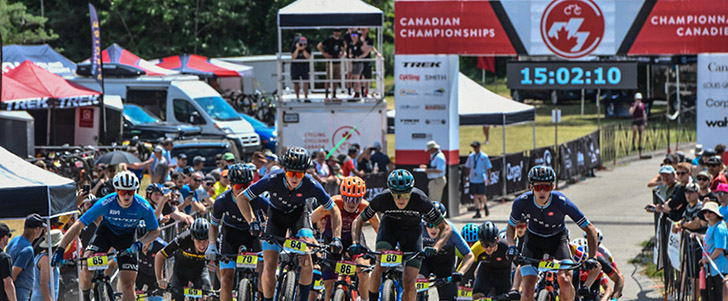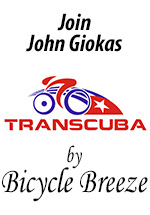December 11/06 5:36 am - 2006 Canadian Cyclist of the Year Award Winners
Posted by Editor on 12/11/06
Commonwealth Games and Pan Am Champions Win 10th Annual Canadian Cyclist of the Year Awards
Voting for the 10th annual Canadian Cyclist of the Year Awards concluded on Monday, December 11, 2006 at Noon (EST), with two riders dominating the standings. Max Plaxton of Tofino, BC won both the Male Cyclist and Best Individual Performance awards, while Marie-Hélène Premont of Chateau Richer, Quebec repeated as the Female Cyclist of the Year.
The 21 year old Plaxton, a professional mountain bike rider with the Rocky Mountain-Business Objects team, entered the 2006 season after a year of illness and missed opportunities. He spent the early part of 2006 racing in North America, racking up three wins in three races on the Canada Cup circuit, as well as taking the silver medal at the National championships. At the World Championships in Rotorua, New Zealand, Plaxton won the bronze medal, and then finished his season by winning the Pan American championship in Camboriu, Brazil. Plaxton ends the year ranked 34th in the world rankings; the highest Canadian male ranking. Plaxton took 41% of first place votes, followed by profesional road racer Ryder Hesjedal of Victoria with 25% of first place votes.
"It's a great honor to be recognized by all of Canada as the best overall Male Cyclist of 2006. I think that I have had an all around good year but for me this is more something to build on. I must say, though, that I really respect Ryder's (Hesjedal) inspirational 4th place ProTour result. Thanks to everyone that voted for me, your support means a lot."
Marie-Hélène Premont's victory in the women's category is her third in four years. Premont, the Olympic silver medalist for mountain bike in Athens, began her season with the gold medal at the Commonwealth Games in Melbourne, Australia. Premont also won the bronze medal at the World Championships (Rotorua, New Zealand), plus two World Cup victories and her third straight national title. Premont ends the season ranked third in world standings. Premont took 44% of first place votes, followed by national road champion Alexandra Wrubleski of Regina, Saskatchewan with 31% of first place votes.
Max Plaxton also won the Best Individual Performance Award, for his victory at the Pan American Championships in Camboriu, Brazil. Marie-Hélène Premont garnered more first place votes for her World Cup win at Mont Ste Anne, Quebec, but Plaxton had more second and third place rankings to win an extremely close contest.
Canadian Cyclist also presents two awards that are not voted upon - the Best Newcomer and, new this year, the Best Paralympic Performance. Alex Wrubleski, who won both the National Time Trial and Road titles in her first full year of racing at the elite level, wins the Roger Sumner Award, as Best Newcomer.
Louis Barbeau, Director General of the FQSC (and Chef de Mission for Canada at the Athens Paralympics) pointed out that we do not have an award for the paralympic sector of our sport, which we are pleased to rectify this year. The first winners of this annual award are the tandem team of Pierre-Olivier Boily and Stéphane Côté. Prior to their cooperation, Stéphane Côté had been involved in tandem racing since 1996 and had already participated to two Paralympic Games (1996 and 2000) with other pilots. In 2004, they participated to the Paralympics together in Athens and finished fourth in the road race.
Louis Barbeau has provided the following account of the obstacles the team faced this season:
On January 10th 2006, Pierre-Olivier Boily was the victim of a major car crash as his car was hit by another one which was heading in the wrong direction on Highway 10, just before Sherbrooke (Quebec). As a result of this head on collision, the man in the other car died, but luckily Pierre-Olivier and his friend survived this accident with multiple fractures. Pierre-Olivier suffered fractures to both ankles, his left knee and his right hip. After undergoing four surgeries, the rehabilitation process began. Though no one would have bet against Pierre-Olivier being back on his bike in 2006, no one in his right mind would have thought that he would have been racing. Out of the rehab center at the end of February, Pierre-Olivier started riding his bike sometime early March on his trainer. At the time, he was still using crutches to walk around. He then went in Virginia at the beginning of April to train and entered his first race in Brossard (Quebec) mid May.
Given the fact that tandem racing is very muscular, and since Pierre-Olivier had asked team mate Sébastien Moquin to take his place as a tandem pilot for the season with Stéphane Côté, Pierre-Olivier did not race tandem for most of the season. In the meantime, he participated to many races and amazed everyone, including himself with his performances. After Road Nationals, Pierre-Olivier and Stéphane decided to reunite and participated to Track Nationals with limited success. Nevertheless, the tandem was selected for Worlds in Aigle (Switzerland) September 8th -18th, mainly on the grounds of their results from previous years, as being the most competitive male tandem in Canada.
At the Worlds, they performed very well, again given where they came from. They obtained an 8th place (out of 27) in the Individual Pursuit, 10th in the Kilo (out of 31), 12th in the road time trial (out of 39) and 2nd in the road race (out of 39). The medal (silver) was the only medal won by Canada at these Worlds.
Since then, Pierre-Olivier had most of his screws removed except for the ones in his hip that will most probably remain in place. This tandem represents the best chance of a medal for Canada at the next Paralympic Games in Beijing (2008).
| Return to Canadian Cyclist homepage | Back to Top |





